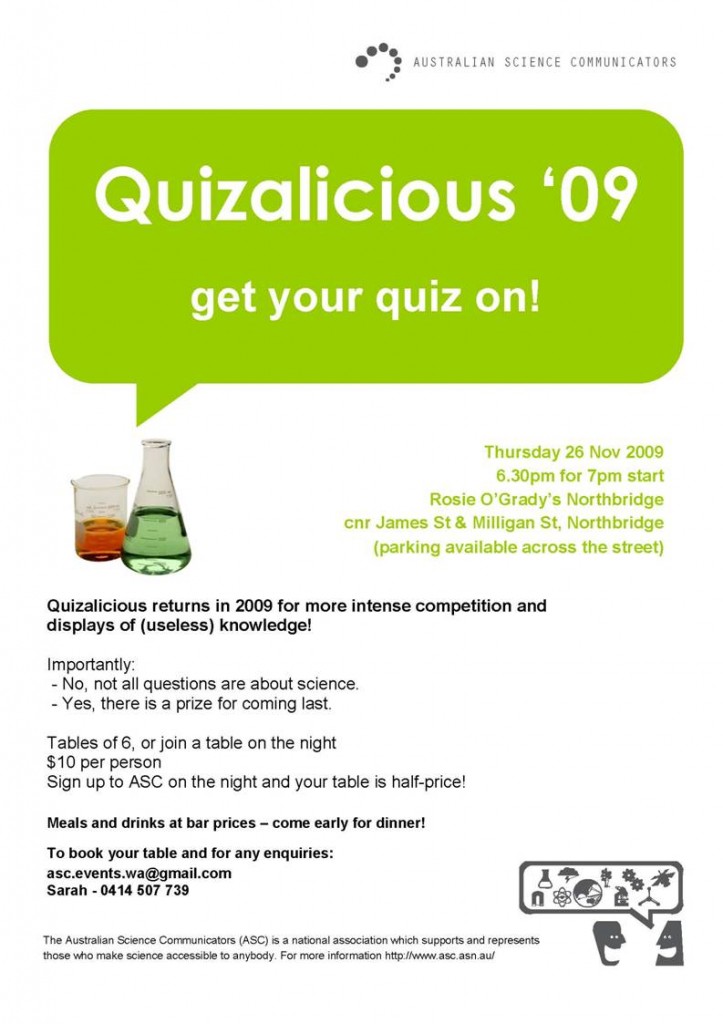Dear ASCers,
I have much pleasure in posting the following call for research papers for the ASC National Conference in February (below).
The idea of a segment of the conference devoted to hearing about and discussing the latest research on Science Communciation is long overdue.
The call is open to anyone involved in science communcation research–attached to a university or not. All papers will be assessed on their merits.
Much thanks should go to Rod Lamberts and his science communication colleagues for organising this.
Tim Thwaites, National President
Research Track Call for papers ASC National Conference 2010 8 � 10 February
Preamble The ASC National Conference will enable science communication researchers and practitioners to share experiences and learn from each other. The research track provides opportunities to present work, identify areas that need enquiry, investigate how to improve practice, and strengthen practitioner-researcher collaborations.
To maximise the opportunity for interaction, standard presentations will be minimised and dialogue and networking fostered.
Whether you are academic, practitioner or student, if you are involved with any research or evaluation that has implications for science communication, we encourage you to put forward a paper.
THE DEADLINE FOR ALL RESEARCH-TRACK SUBMISSIONS IS 7 December
Research communication and discussion will be formally facilitated at the conference in four ways.
1) Research papers – parallel session presentations Presentations on an aspect of science communication research or evaluation will be given 10 minutes talk-time and followed by panel sessions or roundtable discussions, depending on the number of people attending the session. It is not necessary to submit under a particular conference theme, but where relevant and possible, presentation sessions will be thematically grouped.
SUBMIT * An overview of not more than 500 words to: conference.submissions@asc.asn.au * Submissions can be on any science communication research or evaluation area, but must include: o Your name, title and contact information o A brief outline explaining why the paper constitutes �science communication� research and/or evaluation. (100 words) o An abstract outlining the context or event, research questions, methods, outcomes, etc. (350 words) o One to three questions that the research or evaluation has inspired, or provokes, for discussion after the presentation. (50 words per question)
2) Research contributions to plenaries, workshops or symposia * People submitting papers that are of particular relevance to specific plenaries, workshops or symposia may be invited to contribute to these fora instead of a research-specific session. It will be up to the session/theme convener to invite and provide details to presenters directly. * You can choose to make submissions to contribute to specific sessions, and they will be forwarded to that forum�s convener. Should you wish to submit directly to a specific session, please indicate the name of session to which you would like to contribute clearly at the beginning of your 500-word overview * If your submission to a specific session cannot be included in that session, it could be accepted for submission in a research track session. The convener of the session will forward your submission to the research stream committee.
3) Research student sessions The goal here is to bring together widely distributed research students in science communication and related fields. Interaction with peers can be a confidence-building reality check and an invaluable avenue for finding ways to clear hurdles that your supervisors have not, or cannot, address. These sessions will focus on discussion, sharing of experiences, and networking rather than formal presentations. However, you are welcome to organise extended focus on one individual�s work in one of the conference�s ad hoc sessions (outlined below at 4)
For these sessions, please tell us what you would like to see in these sessions, and what you hope to get out of them. For example: * Preferred session format. For example; roundtables, panel- discussions, problem-solving workshops or informal drinks * Preferences for session content. For example; current big issues in science communication research or methodological matters.
4) Ad Hoc sessions Flexible meeting spaces and facilitators will be on hand for ad hoc sessions in response to ideas and issues that have been nagging you or issues and questions that arise during the conference.
Some of these sessions may be �clinics�, where you bring a problem where you would like input. For example, would you like an academic to assist in developing an evaluation tool for a community outreach program that you are running? Or, are you a researcher who needs your theory �reality-checked� by a practitioner?
NOTE – These sessions do not have to be about research
Details about how to take advantage of this opportunity will be provided at the conference.
AUSTRALIAN SCIENCE COMMUNICATORS _______________________________________________ ASC-list mailing list list@asc.asn.au http://www.asc.asn.au/index.php?option=com_content&task=view&id=97&Itemid=115

